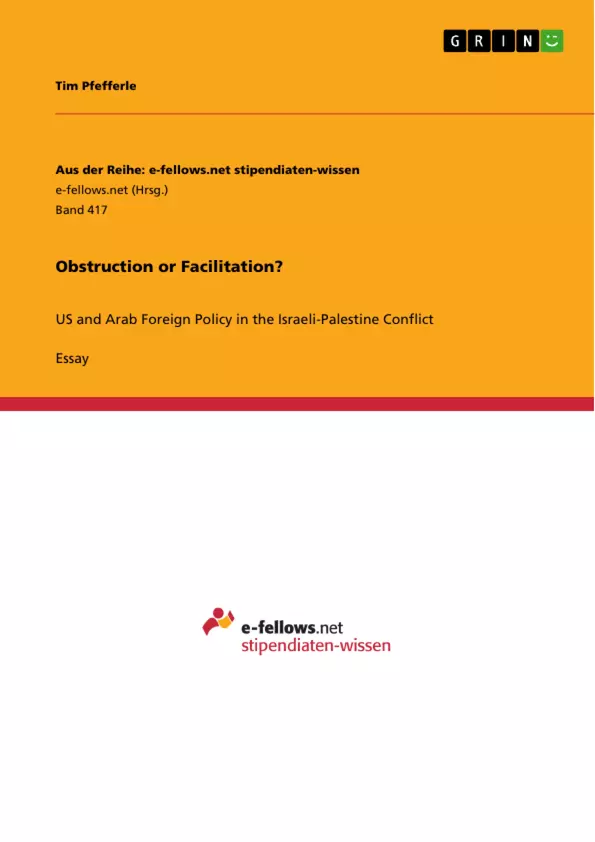The Israeli-Palestinian conflict is hugely influenced by the respective foreign policies of their main allies, the United States as a supporter of Israel and the surrounding Arab states on the Palestinian side. While some outside intervention may be necessary, it can also lead to an entrenchment of the parties. Therefore, this essay will investigate whether US and Arab policies were beneficial or detrimental to the efforts to arrive at a peace agreement in terms of the major contested issues; land and borders, Jerusalem, recognition and refugees.
Inhaltsverzeichnis (Table of Contents)
- Introduction
- Land, Borders and Settlements
- Jerusalem
- Recognition
- Refugees
Zielsetzung und Themenschwerpunkte (Objectives and Key Themes)
This essay investigates the influence of US and Arab foreign policy on the Israeli-Palestinian conflict, particularly regarding land and borders, Jerusalem, mutual recognition, and Palestinian refugees. It aims to determine whether these policies have facilitated or obstructed peace agreements.
- The impact of US and Arab foreign policy on the Israeli-Palestinian conflict
- The role of external actors in shaping resolutions, summits, and accords
- The influence of power asymmetry between Israel and the Palestinians
- The challenges of compromise and coexistence in the context of the conflict
- The importance of recognition and Palestinian self-determination
Zusammenfassung der Kapitel (Chapter Summaries)
Introduction
The essay explores the role of US and Arab foreign policy in the Israeli-Palestinian peace process, highlighting the complexities of ideology, nationality, and power dynamics.
Land, Borders and Settlements
This section examines the conflicting positions on land and borders, including Israeli settlements, and how US and Arab policies have impacted these issues. The US is criticized for its support of Israel's territorial claims, while Arab states are highlighted for their inconsistent and often ineffective policies.
Jerusalem
The chapter analyzes the challenges posed by the status of Jerusalem, emphasizing the religious significance for both Jews and Muslims. The US policy of an undivided Jerusalem is explored, and both US and Arab failures to promote effective compromise on Jerusalem are highlighted.
Recognition
This chapter focuses on the lack of recognition between parties as a major obstacle to peace. The US and Arab states' delayed recognition of the Palestinians and the PLO is explored, emphasizing the detrimental impact on the peace process.
Refugees
The section examines the issue of Palestinian refugees, exploring the US and Arab states' roles in addressing the refugee crisis. The lack of effective policies to address the refugee situation and the perpetuation of their statelessness are discussed.
Schlüsselwörter (Keywords)
The primary keywords and focus topics include Israeli-Palestinian conflict, US foreign policy, Arab foreign policy, peace process, land and borders, settlements, Jerusalem, recognition, Palestinian refugees, power asymmetry, compromise, and coexistence.
Frequently Asked Questions
How does US policy affect the Israeli-Palestinian conflict?
The US has traditionally been a strong supporter of Israel, impacting negotiations on borders, settlements, and the status of Jerusalem.
What is the Arab states' role in the conflict?
Arab states generally support the Palestinian side, but their policies have often been inconsistent or ineffective in securing a lasting peace agreement.
Why is Jerusalem such a contested issue?
Jerusalem holds immense religious significance for both Jews and Muslims, making compromise on its sovereignty extremely difficult for both sides.
What are the main obstacles regarding Palestinian refugees?
The "Right of Return" and the status of millions of stateless refugees remain unresolved, with neither external powers nor the parties themselves finding a viable compromise.
Has outside intervention helped or hindered the peace process?
While intervention is necessary for mediation, it has also led to an entrenchment of positions due to power asymmetries and conflicting foreign policy interests.
- Quote paper
- Tim Pfefferle (Author), 2012, Obstruction or Facilitation?, Munich, GRIN Verlag, https://www.grin.com/document/191837



